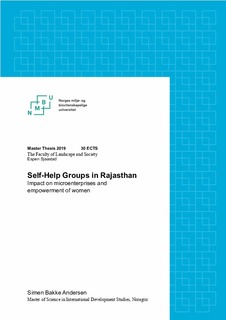| dc.description.abstract | There is still a great divide between men and women in the developing world, and the idea that a woman is lesser than a man is deep entrenched in the Indian culture and society even today. The traditional classification of a women is her belonging to the house and in support of the family, while the husband usually generates the income for the household. Poor women have been but are still today stripped of their economic independence and this has been one of the motivations behind the emergence of microfinance and Self-Help Groups (SHGs) as they have worked towards generating economic empowerment of women. There is however a still a difference between the genders measured in other dimensions than simply financial inclusion and poverty. Social- and psychological factors such as self-confidence, self-esteem and freedom of movement are often limited for females, and especially if they are married. The lack of political empowerment is also evident among poor women, where they usually do not take part in political activity or know their own rights in the society they live. Microfinance through SHGs has in general been credited for economic empowerment through access to credit, savings and insurance products and is responsible for creating income-generating activities for the members of the SHGs. These groups are usually targeting female entrepreneurs and creates an environment where women can meet and socialize. There exist a vast amount of literature on microenterprise performance, behavior of microentrepreneurs and the impact that SHGs have had on the different dimensions of empowerment. This research has been dedicated to further explore the theories about on the impact of SHGs, where the focus has been in testing the literature in Rajasthan, India. The quantitative research that was conducted in the area of Jaipur concludes that the length of SHG participation has had a positive impact on investments in the microenterprises, and there has been found evidence of the importance of SHGs when it comes to both economic and social- and psychological empowerment. | nb_NO |

